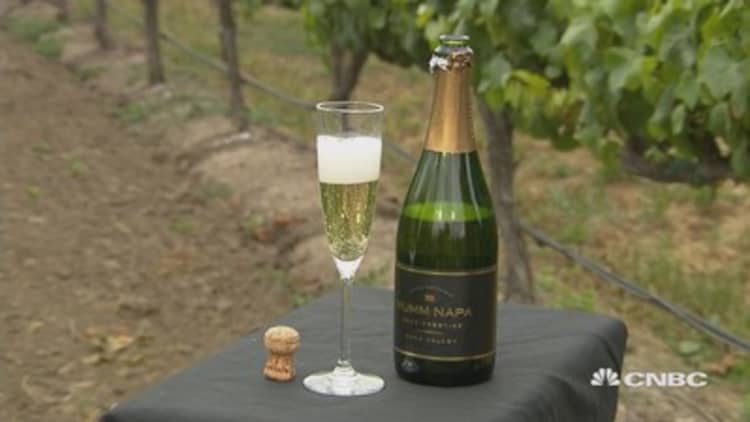The drought in California is so severe, no solution is considered too far-fetched. Not even using recycled toilet water to irrigate the nation's most prestigious wine grapes in Napa Valley.
Call it effluent for the affluent.

"California has a lot of growing up to do on how to use water well," said Will Nord, a long time Napa wine grape grower who has been using recycled wastewater for years to irrigate his vines. As for concerns that the water might affect the flavor of the grape's juice? "No impact at all," he said.
Nord owns about 450 acres of vineyards, selling grapes to Mumm Napa Valley, Beringer, Markham and others. He grows several acres of pinot noir at his Green Island Vineyards in American Canyon, at the southern tip of Napa County. All of the irrigation water for this vineyard comes from the nearby American Canyon Water Reclamation facility.
Last year, the water reclamation plant recycled about 10 percent of its wastewater, or 180 acre feet, with the rest going out to sea. The city is spending $3 million to upgrade and expand so that 1,000 acre feet can be recycled.
Read MoreA house that thumbs its nose at the drought
"We have customers that make concrete products, we have landscaped areas, we have garbage facilities that use potable water for dust control. All of these uses could be recycled water," said Jason Holley, public works director for the city of American Canyon.
Here's how the recycling system works. Wastewater is powerfully vacuumed through a filtering system from General Electric to remove bacteria and particles. The water is then treated with UV light and chlorine to make it clean enough to irrigate. More technology would be needed (and is being considered) in order to make the water potable for humans.
"The Department of Public Health allows us to use it for irrigation, it allows us to flush toilets, it allows us do a lot of things. It's not, at the moment, allowed for potable consumption," said Holley. When asked if he's ever tasted the treated irrigation water, he replied with a laugh, "No."
We're going to come back to a point in the next five to 10 years where I'm sure all the recycled water will be efficiently used instead of just dumped into the river and into the bay.Will NordNapa grape grower
American Canyon is investing in recycling water because it has no reservoir. Its state water comes from the snowpack miles away in the Sierra, which is at historic lows. "When the state says you're going to cut, we've got to cut," said City Council Member Belia Ramos.
Holley said it costs 10 to 20 percent more to process the water to make it good enough for irrigation. Currently, revenues for water agencies are dropping as Californians use less water, a situation which may, ironically, lead to rates' going up. "All utilities are going to have to look at rates," said Holley. "You're going to have to account for the fact that your revenue has gone down."
Read More
Other regions of Napa Valley are either using recycled water or considering it.
"I think the industry, vineyard managers and vineyard owners, recognize that it's perfectly acceptable and a great alternative," said Holley.
Nord said the technology to clean water is so good and the need for more water so great, "We're going to come back to a point in the next five to 10 years where I'm sure all the recycled water will be efficiently used instead of just dumped into the river and into the bay."


